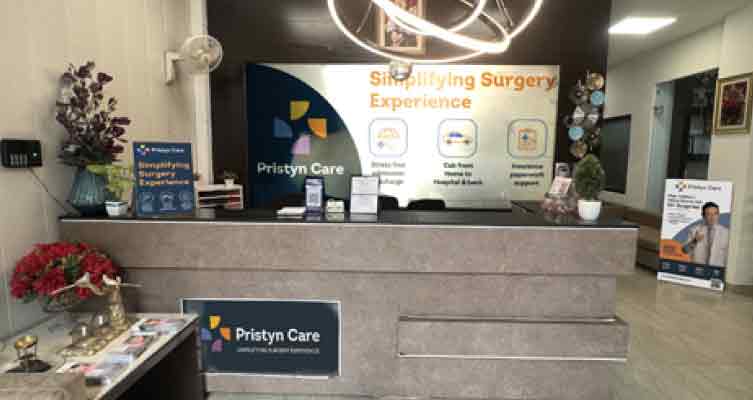
Delhi
USFDA Approved Procedures
Minimally invasive. Minimal pain*.
Insurance Paperwork Support
1 Day Procedure




Advanced Ultrasound Types Available in Delhi
At Pristyn Care in Delhi, our experienced specialists ensure a comfortable and professional experience during your examination. Our goal is to ensure accurate diagnosis with maximum comfort for the patient. Our ultrasound types include:



 NABH
NABH
Pristyn Care Sheetla Hospital in Gurgaon makes quality healthcare more accessible and personal. The hospital offers advanced treatment across various specialties like women’s health, child and neonatal care, etc. and minimally invasive surgery. With 36 well-equipped beds, 3 modern operation theatres, and a dedicated ICU, Pristyn Care Sheetla works with comfort and efficiency. With 90+ experienced doctors and a courteous professional medical team, we ensure clear communication, personalized care, and real results – so you feel supported every step of the way.
...Read More
_11zon-ca864071060981e9.jpg)
_11zon-ca864071060981e9.jpg)

 NABH
NABH
Pristyn Care Elantis is dedicated to revolutionising surgical care. We combine the latest medical technology with highly skilled professionals and a patient-centric approach to transform the healthcare experience. Our team of doctors at Pristyn Care Elantis, strives to simplify the entire patient journey, ensuring a seamless process from diagnosis through recovery.
We offer specialised treatments across a wide range of medical fields, including proctology, laparoscopic surgery, ENT (ear, nose, and throat), vascular, gynaecology, urology, aesthetics, orthopaedics, ophthalmology, and weight loss solutions.
The Suites & Rooms at Pristyn Care Elantis are designed with your comfort in mind, offering a welcoming ambiance and top-notch amenities to make your stay as pleasant as possible.
Our highly skilled medical team, supported by advanced infrastructure, makes us a trusted choice for comprehensive healthcare solutions.
...Read More



 NABH
NABH
Pristyn Care Diyos Super-Speciality Hospital is committed to redefining modern healthcare by blending cutting-edge technology with compassionate, patient-first care. Located in the heart of Safdarjung Enclave, South Delhi, our NABH-accredited facility offers advanced treatment solutions across multiple specialties, ensuring superior outcomes and faster recoveries.
Our dedicated team of doctors at Pristyn Care Diyos Hospital aims to streamline the entire patient journey—from consultation to recovery—by providing seamless, end-to-end medical care tailored to each individual’s needs.
We offer specialised medical services across a wide range of fields, including urology and andrology, general and laparoscopic surgery, cosmetic and plastic surgery, gynaecology and urogynaecology, orthopaedics, neuro and spine surgery, ENT (ear, nose, and throat), oncology, internal medicine, and critical care. Our facility also extends home care services for enhanced convenience and continuity of care.
The suites and patient rooms at the Hospital are thoughtfully designed to ensure a comfortable and healing environment, featuring modern amenities, hygienic surroundings, and attentive support for both patients and their attendants.
Supported by a skilled clinical team and world-class infrastructure—including modular operation theatres with HEPA filters, advanced diagnostic labs, and high-end medical equipment— Pristyn Care Diyos Hospital stands as a trusted destination for safe, effective, and personalised healthcare.
...Read More



Pristyn Care La Midas is an award-winning, internationally recognised Super Specialty Hospital located in Gurugram, Haryana. We are dedicated to delivering the highest quality aesthetic services, combining advanced medical technology with a compassionate, patient-first approach.
Our state-of-the-art facility offers a comprehensive range of surgical and non-surgical treatments for skin, hair, and body, all at affordable prices. We specialise in services such as laser hair removal, skin rejuvenation, body contouring, and hair restoration, ensuring that each patient receives personalised care tailored to their unique needs.
At Pristyn Care La Midas Hospital, we prioritise patient comfort and satisfaction throughout the treatment journey. Our experienced team of medical professionals is committed to helping you achieve your beauty and wellness goals in the most natural and effective ways possible.
Experience the perfect blend of luxury and innovation at Pristyn Care La Midas Hospital, where your well-being is our top priority.
...Read More



Located in South Delhi, our facility is spacious, serene, and designed to make couples feel comfortable throughout their treatment. We pride ourselves on a warm, clean environment, offering easy access and convenient parking.
With a reputation built on the strength of our experienced clinical team, we specialise in customised treatment protocols and provide comprehensive care, from the initial consultation to treatment completion. Pristyn Care Ferticity Super Specialty & IVF Hospital has helped over 40,000 families worldwide realise their dream of parenthood, maintaining the highest success rates in the field.
Our clinic ensures a partnership between patients, doctors, and staff, delivering compassionate care every step of the way.
...Read More
Delivering Seamless Surgical Experience in India
Your safety is taken care of by thermal screening, social distancing, sanitized clinics and hospital rooms, sterilized surgical equipment and mandatory PPE kits during surgery.
A dedicated Care Coordinator assists you throughout the surgery journey from insurance paperwork, to free commute from home to hospital & back and admission-discharge process at the hospital.
Our surgeons spend a lot of time with you to diagnose your condition. You are assisted in all pre-surgery medical diagnostics. We offer advanced laser and laparoscopic surgical treatment. Our procedures are USFDA approved.
We offer free follow-up consultations and instructions including dietary tips as well as exercises to every patient to ensure they have a smooth recovery to their daily routines.
At our ultrasound centre, we offer a range of services including abdominal, pelvic, obstetric, musculoskeletal, and vascular ultrasounds, along with specialised scans such as 3D/4D pregnancy scans and echocardiograms.
Preparation depends on the type of ultrasound. For abdominal ultrasounds, we recommend fasting for 6-8 hours before your appointment. For pelvic ultrasounds, you may be asked to drink plenty of water beforehand to ensure a full bladder.
Yes, ultrasound scans are non-invasive and widely considered to be very safe. They use sound waves rather than radiation, making them a safe option for both adults and children, including during pregnancy.
In most cases, a referral from your specialist is required to book an ultrasound. However, some centres may offer direct booking options for certain types of scans, so it’s best to check with our reception team.
The length of the scan varies depending on the type of ultrasound. Generally, scans can take between 15 to 45 minutes. Our team will ensure you’re comfortable throughout the process.
The sonographer will provide you with an initial overview of the scan, but the full report will typically be reviewed by a doctor and sent to your referring healthcare provider. This may take a few days.
Yes, we provide ample parking for our patients. For those using public transport, the centre is conveniently located near major bus and train routes.
If you need to cancel or reschedule your appointment, please contact us as soon as possible. We request a minimum of 24 hours’ time to avoid any cancellation fees and to allow us to offer your slot to another patient.
Ultrasound is widely used and suitable for many people. However, your doctor will confirm if it’s the right diagnostic test for your condition.
You may be eligible for an ultrasound scan if:
The ultrasound procedure is simple, safe, and quick. Here’s what you can expect:
Ultrasound procedures do not usually require any recovery time. However, here’s what you should know: